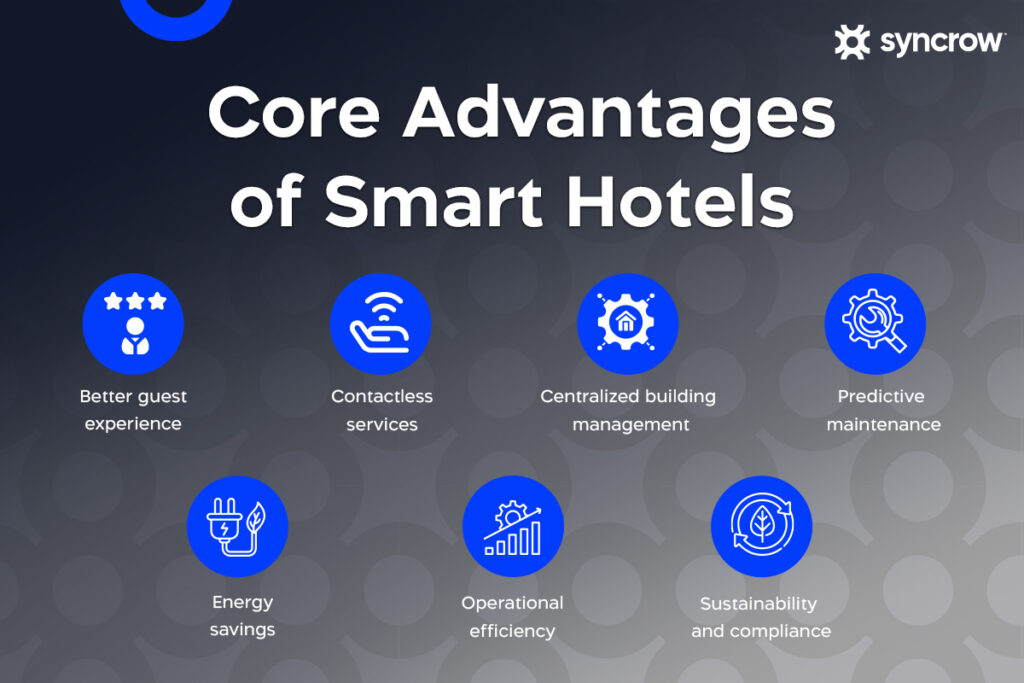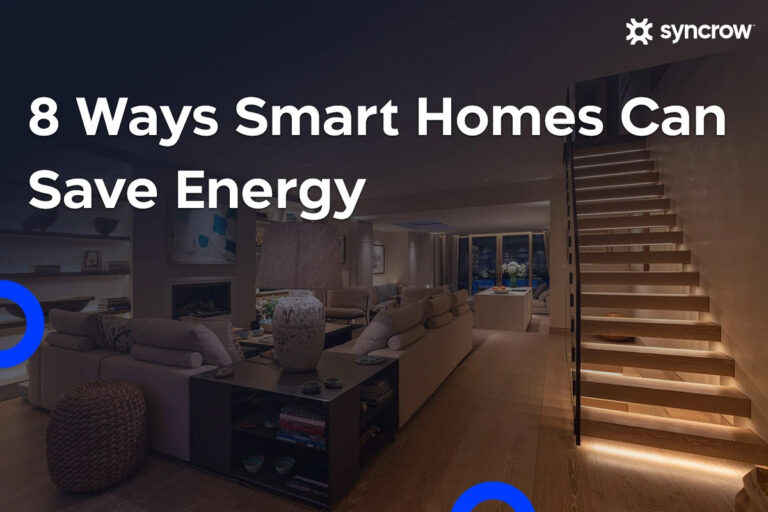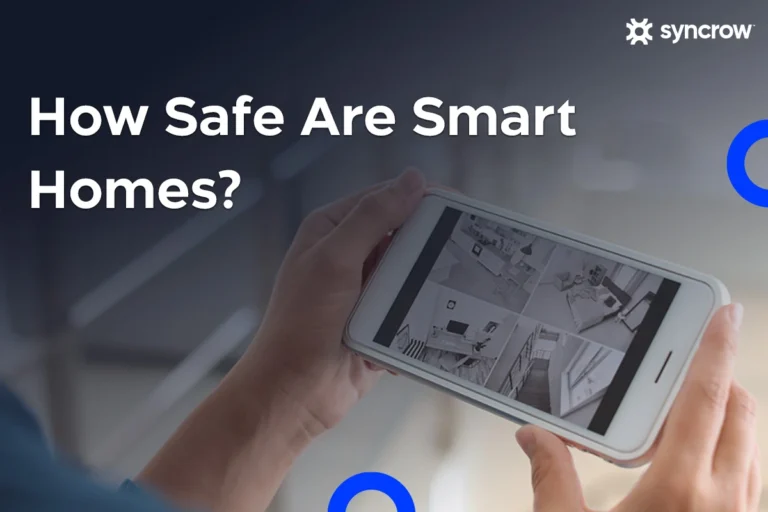The hospitality industry in the GCC region has been growing rapidly in the past few years. In 2024, Dubai alone welcomed around 18.72 million overnight global visitors, and over 30 million international arrivals visited Saudi Arabia.
As these nations lead ambitious economic diversification and tourism projects, the demand for efficient, sustainable, and smart hotels is increasing. Guests today expect more than luxury; they seek personalized experiences that offer both comfort and control.
To meet these evolving demands while managing costs and sustainability goals, the hotel industry is turning more towards IoT (Internet of Things) technology. This is where smart hotel technology comes into the picture. So, what is a smart hotel, and why is IoT in hospitality becoming a necessity in this thriving industry? Keep reading to find out more.
Explaining the concept of a smart hotel
A smart hotel is a fully connected environment in which automation, data, and smart devices work together to enhance guest satisfaction and hotel operations.
Think of a smart room where lighting, air conditioning, and curtains automatically adjust as a guest enters, based on their personal preferences. Or a lobby where guests can check in using their mobile devices, avoiding queues and unnecessary interactions. Behind the scenes, hotel operators monitor and control energy use, security, and maintenance from a single platform.
Smart hotels go beyond “nice-to-have” gadgets. They represent a fundamental shift in how hotels operate, combining efficiency and personalization.
Why are smart hotels the future of hospitality in the GCC?
With Dubai positioning itself as a global leader in tourism and smart city development, and Saudi Arabia launching mega-projects like NEOM, smart hotels are quickly becoming the standard for new hospitality developments.
Several factors are driving this shift toward smart hotels in the UAE and the rest of the GCC. International travelers are increasingly expecting high-tech, convenient, and personalized experiences. At the same time, intense competition among hotels pushes operators to offer unique and memorable stays that differentiate them from others. Rising operational costs, particularly related to energy and staffing, are also forcing hotels to seek more efficient solutions to boost profitability.
Furthermore, government mandates focused on preserving the environment are encouraging hotels to adopt smarter, more eco-friendly practices. For example, in 2021, Dubai Tourism issued a directive for hotels to comply with key green requirements.
Core advantages of smart hotels and IoT
Smart hotels are defined by their technological integration. Here are some of their key benefits:

Smart hotel room automation for a better guest experience
One of the core features of smart hotels is automation, where guests can control lighting, room temperature, curtains, and entertainment through mobile apps. This smart room technology creates a personalized environment that adapts to guest preferences, delivering a sense of comfort and luxury.
In addition, occupancy sensors automatically detect when a room is vacant, adjusting settings to conserve energy without compromising the user experience. For repeat guests, the system can remember personalized settings, making each stay feel customized and thoughtful.
Contactless and automated services
Smart hotels offer contactless and fully automated services, streamlining the entire guest journey. Guests can enjoy mobile check-in and check-out, as well as seamless room access and keyless elevator entry, eliminating the need to queue at reception. In-room tablets or mobile apps serve as digital concierges, allowing guests to request room service, housekeeping, or additional amenities with just a few taps.
Centralized building management
Behind the scenes, smart hotels employ centralized building management systems that enable operators to monitor and control all critical functions such as HVAC, lighting, security, and maintenance from a single, unified dashboard. This centralized approach provides real-time insights into energy consumption and system performance, allowing hotels to make quick adjustments that improve operational efficiency. Moreover, the system can automatically optimize building operations based on real-time occupancy and usage data, ensuring that resources are used wisely and sustainably.
Predictive maintenance and operations
Another powerful advantage of smart hotels is predictive maintenance, enabled by IoT sensors embedded throughout the property. These sensors continuously monitor equipment and systems for potential issues, alerting hotel management before problems escalate and disrupt guest experiences. This approach significantly reduces the risk of costly repairs and unplanned downtime, keeping the hotel running smoothly. By anticipating maintenance needs, hotels can prolong the lifespan of their equipment, lower operational costs, and ensure a consistently high standard of comfort for guests.
Energy savings
Energy savings are one of the most significant benefits of smart hotel automation systems. By using technologies like occupancy sensors, intelligent thermostats, and centralized energy management platforms, hotels can control heating, cooling, and lighting in real time, ensuring energy is used only when and where needed.
According to Energy Star, a US-based government entity, heating and cooling account for nearly 40% of electricity consumption and over 50% of natural gas usage in hotels and motels. In the GCC region, where air conditioning runs almost year-round due to extreme heat, these numbers are likely even higher. Without automation, hotels often leave cooling systems running in empty rooms to keep them guest-ready, leading to substantial energy waste.
Energy Star also stated that hotels using such solutions can save energy between 35% and 45%, resulting in significant cost reductions.
Operational efficiency
Smart hotels using automation and IoT technologies can increase operational efficiency by streamlining routine tasks, minimizing hotel staff workload, and reducing human error. With predictive analytics, hotels can better manage staff allocation and elevate guest services through data-driven insights.
Sustainability and compliance
Smart hotel solutions support sustainability efforts by helping properties meet green building certifications and comply with government regulations on energy use and emissions. These technologies align with broader national initiatives, such as the UAE’s Green Economy strategy and Saudi Arabia’s Vision 2030 environmental goals.
UAE and KSA are leading the charge in the hospitality industry
Dubai is a pioneer in hospitality excellence, and its buildings are getting smarter every year. Several hotels in the Emirate now offer automated rooms. Saudi Arabia is following suit with its focus on becoming a tourist destination by building ambitious mega-projects. Luxury resorts, business hotels, and eco-friendly accommodations are all adopting smart technologies as a standard feature in the region.
As global guests demand more personalized and connected experiences, and as hotels face pressure to reduce costs and meet sustainability targets, smart hotels powered by IoT technology are no longer optional – they’re essential.
With Dubai and KSA setting the regional standard, hotels across the GCC need to embrace smart technologies to remain competitive, efficient, and future-ready.
Syncrow: Powering the next generation of smart technologies for hotel owners
In the GCC, where hotel owners face rising operational costs, increasing guest expectations, and strict sustainability targets, being a smart hotel has become a necessity. From managing extreme energy demands to delivering better guest experiences, hotels need intelligent solutions to stay competitive.
This is where Syncrow comes in. As a leading provider of smart hotel and building automation in the UAE and Saudi Arabia, Syncrow offers fully integrated IoT solutions that connect and optimize every aspect of hotel operations – from energy management to guest room controls and space management. Ready to future-proof your hotel? Connect with Syncrow today for a free consultation.





